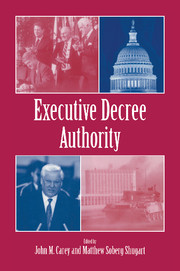Book contents
- Frontmatter
- Contents
- List of Contributors
- Preface
- 1 Calling Out the Tanks or Filling Out the Forms?
- Part I From Delegated to Constitutional Decree Authority
- Part II Constitutional Decree Authority and Conflict Between the Branches
- Part III Absence of Conflict Over Decree
- Appendix of Constitutional Provisions Regarding Decree
- References
- Index
Preface
Published online by Cambridge University Press: 18 December 2009
- Frontmatter
- Contents
- List of Contributors
- Preface
- 1 Calling Out the Tanks or Filling Out the Forms?
- Part I From Delegated to Constitutional Decree Authority
- Part II Constitutional Decree Authority and Conflict Between the Branches
- Part III Absence of Conflict Over Decree
- Appendix of Constitutional Provisions Regarding Decree
- References
- Index
Summary
“Don't do edited volumes.” This might be the most common piece of advice passed down from more experienced to less experienced political scientists. The reasons offered are, first, that coordinating a group of contributors inevitably entails more aggravation than simply conducting the research oneself; and second, that edited volumes tend to end up as collections of loosely related essays, not coherent and unified research projects.
With respect to the first point, we have been blessed with a group of contributors who combine intelligence, creativity, and an impressive respect for deadlines. If there was any surplus aggravation generated by this project, it was certainly our gift to them, rather than vice versa. With respect to the second point, we believe this book defies the “loosely related essays” label. Indeed, we undertook this as an edited volume because we had a clearly specified research project that we could not feasibly pursue any other way. We initially produced an essay (now Chapter 1) establishing a set of hypotheses regarding the use of executive decree authority. To test these hypotheses required more empirical knowledge of politics across a diverse set of countries than we could ever hope to acquire ourselves. The solution was to draw on specialists on politics in these countries who are committed to producing broadly comparative work and to testing theoretical propositions empirically. All the case study essays were written with the hypotheses in hand, and all address a common theoretical agenda.
- Type
- Chapter
- Information
- Executive Decree Authority , pp. xi - xiiPublisher: Cambridge University PressPrint publication year: 1998

